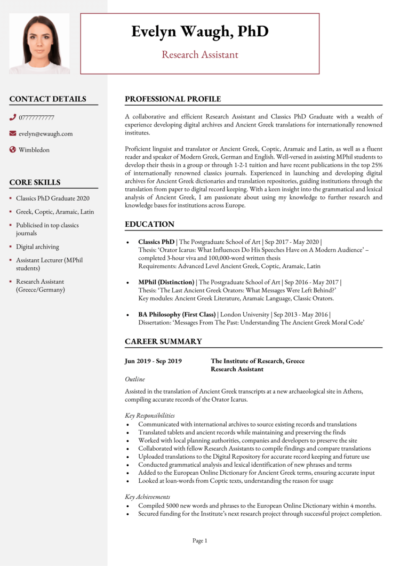You’ve spent years developing specialist knowledge and creating original work that makes a real contribution. Now you need to condense that achievement into a CV that will actually get noticed by employers.
A doctorate speaks volumes about your expertise, but it’s your CV that will turn those credentials into career opportunities. This guide and its 2 PhD Graduate CV examples will help you do just that.
Research Assistant CV example
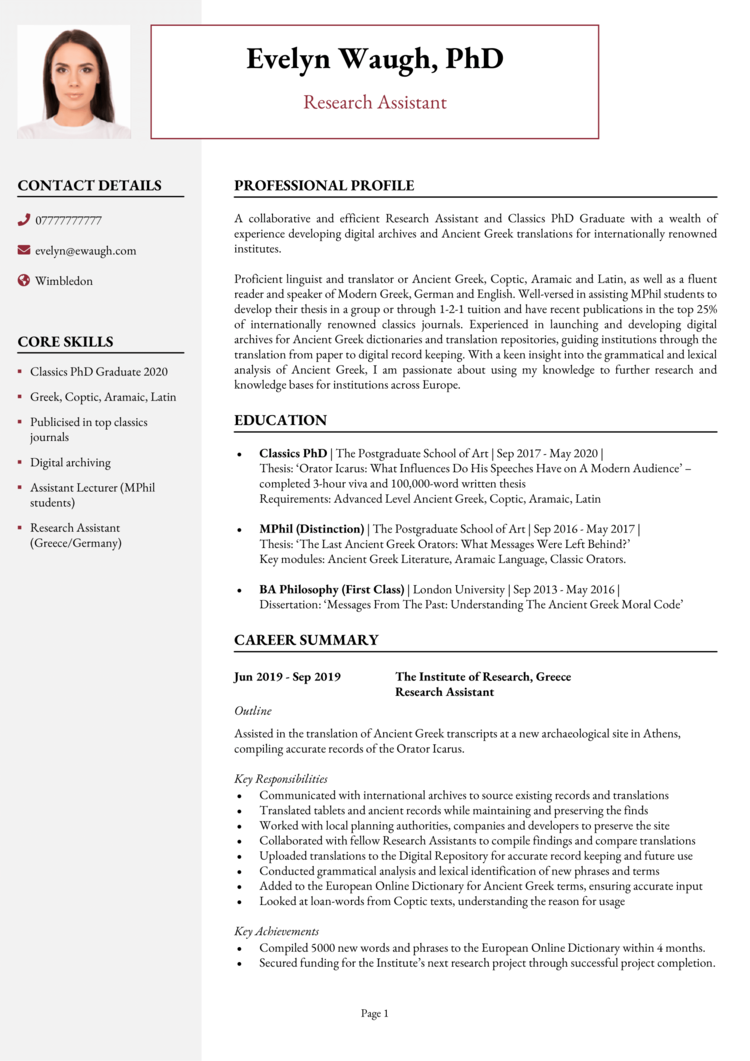
PhD Graduate CV example
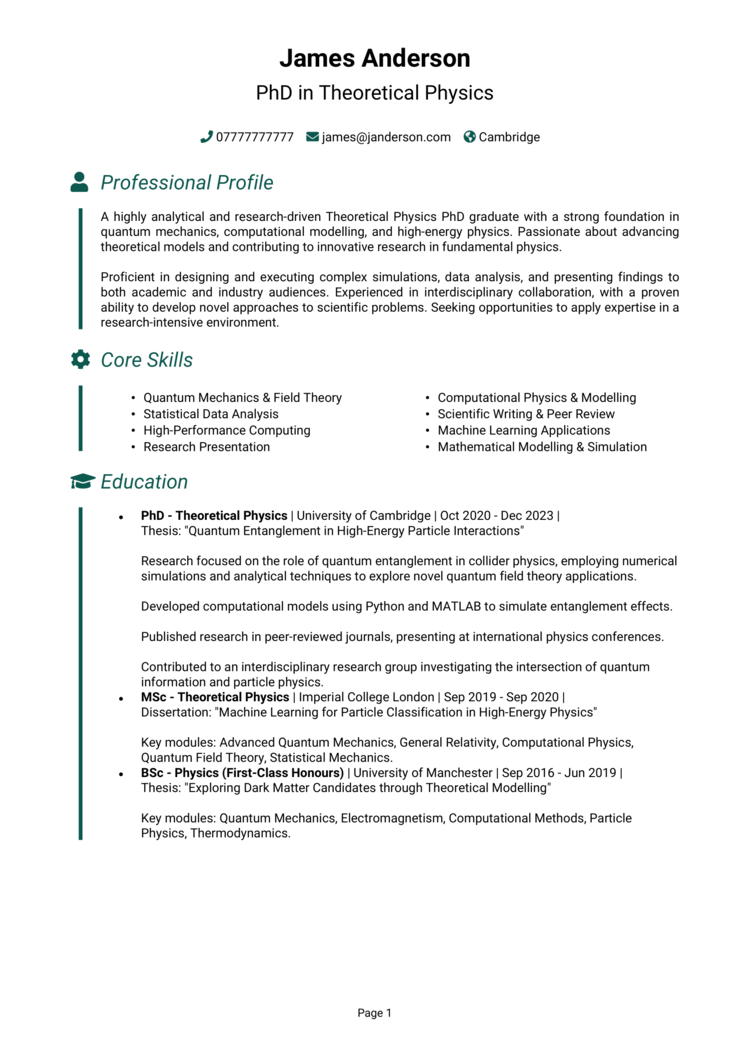
How to write your PhD Graduate CV
Discover how to create a quality PhD Graduate CV with this simple step-by-step guide.
A PhD is proof that you can commit to a long-term goal and deliver results – qualities that employers value far beyond academia. But unless your CV frames that achievement in the right way, it’s easy for your experience to get lost in the details.
Whether you’re pursuing a postdoctoral role or exploring a completely new career path, this guide will walk you through the process of writing a CV so that it speaks directly to the needs of your next employer.
How should you structure and format a PhD Graduate CV?
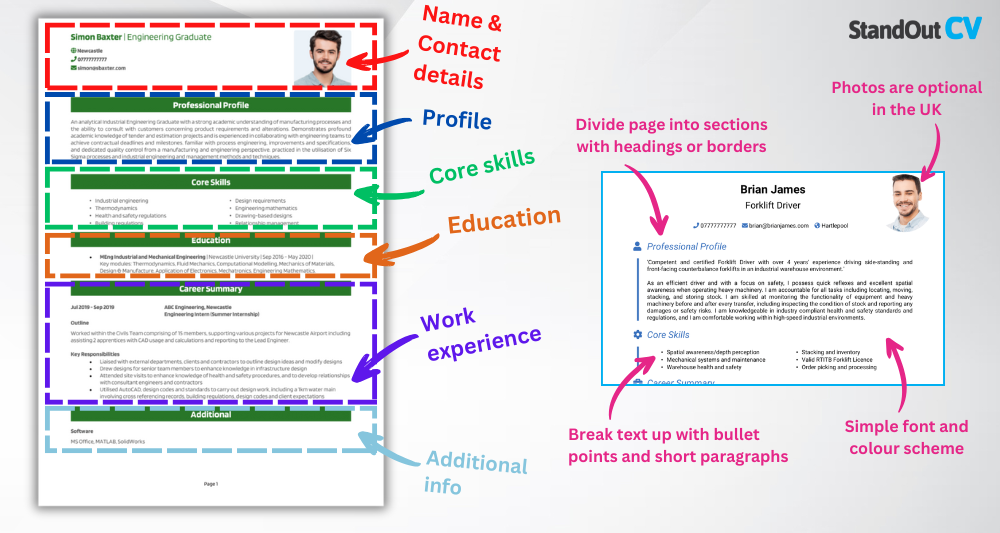
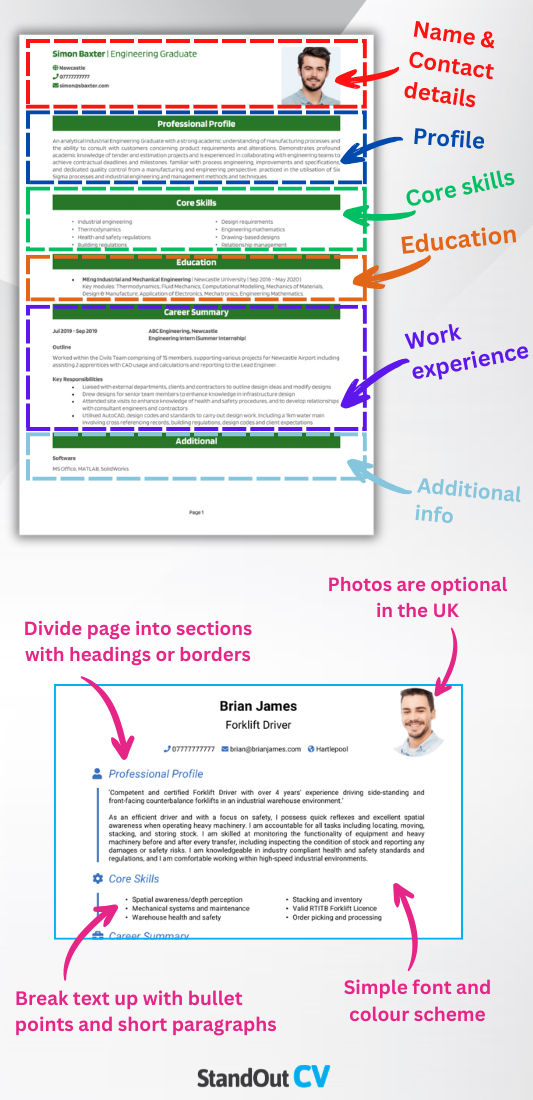
A strong CV structure makes it easy for employers to grasp your strengths at a glance. The goal is to present your experience in a way that flows naturally, keeping the focus on your most relevant and impressive points – much like a clear, well-argued research paper.
Here’s the layout to follow:
- Name and contact details – These personal details sit at the top to provide easy access for prospective employers.
- Profile – Hook the recruiter right away by stating the value you’ll bring their company.
- Core skills – State your best qualities at a quick glance.
- Work experience – List any of your previous job titles from newest to oldest.
- Education – Show off your academic record and qualifications.
- Additional info – Include anything from your hobbies and interests to the languages you speak – these are all totally optional.
When formatting, keep the design clean and professional. Use bullet points throughout to make the text easy to scan. Choose a clear, readable font, use spacing effectively, and divide sections with headings that stand out. Stick to a length of one or two pages so every detail has impact, and give equal attention to white space and content for maximum clarity. Following these formatting principles will ensure a readable CV that recruiters appreciate.
Writing a PhD Graduate CV profile


Your CV profile is your first chance to tell the recruiter how your doctoral experience will benefit them. It’s not a recap of your thesis, so keep it nice and short. It’s a concise pitch showing how your expertise can solve problems and deliver value in a professional setting.
As you might have less work experience than other candidates, a personal statement is a suitable alternative: this allows you to discuss things like your aspirations at greater length.
PhD Graduate CV profile examples
Profile 1
Experienced PhD Graduate with a doctorate in Biomedical Sciences and over eight years of combined academic and research experience within leading universities and laboratories. Skilled in conducting independent research, publishing peer-reviewed papers, and presenting findings at international conferences. Proficient in statistical analysis software such as SPSS and R, as well as laboratory techniques and data visualisation tools. Known for delivering rigorous research while mentoring undergraduates and contributing to collaborative projects across interdisciplinary teams.
Profile 2
Analytical PhD Graduate with a background in Computer Science and five years of experience in research and teaching assistant roles. Specialised in machine learning, data mining, and algorithm optimisation, with publications in high-impact journals. Proficient in Python, MATLAB, and TensorFlow, with experience presenting technical findings to both academic and non-technical audiences. Recognised for bridging theoretical knowledge with practical applications in real-world projects.
Things to have in your PhD Graduate CV profile
Here are some tips on what to put in your CV profile:
- Where you worked – State whether your PhD was based at a university, in industry, or through a research partnership.
- Your top qualifications – Mention your doctorate and any other relevant academic or professional credentials.
- Essential skills – Highlight core competencies you developed and why they’re relevant to the job.
- Projects or focus areas – Specify your research area or specialism and its connection to your target role.
- Value delivered – Explain the impact of your work, from publications to applied solutions or policy influence.
Writing an effective core skills section


Your core skills section gives the recruiter a quick read on your suitability. Keep it targeted to the role you’re applying for, mirroring the terminology used in the job advert. Academic employers may prioritise research and teaching experience, while industry recruiters will look for applied, technical skills.
This section works best when it’s tailored – making the link between what you can do and what the employer needs without padding it with generic terms.
The top skills to highlight in your PhD Graduate CV
- Advanced Research Methodologies – Designing and executing rigorous research projects using qualitative, quantitative, or mixed methods.
- Academic Writing and Publishing – Producing peer-reviewed journal articles, dissertations, and conference papers to share original research.
- Data Analysis and Interpretation – Applying statistical tools, coding techniques, or theoretical frameworks to extract meaningful insights from complex data.
- Grant Writing and Funding Proposals – Preparing applications and budgets for academic, governmental, or private research funding.
- Conference Presentation and Public Speaking – Delivering research findings and participating in academic discussions at national and international events.
- Literature Review and Critical Analysis – Conducting comprehensive reviews of existing research to identify gaps and contextualise new contributions.
- Project Management and Independent Work – Managing long-term academic projects with minimal supervision and meeting key milestones.
- Interdisciplinary Collaboration – Working with scholars from diverse fields to contribute to cross-disciplinary studies and publications.
- Teaching and Mentorship – Leading seminars, workshops, or tutorials and supporting undergraduate or master’s students in their academic development.
- Ethics and Research Governance Compliance – Ensuring research adheres to ethical standards, including consent, confidentiality, and data protection.
Highlighting your education


For a PhD Graduate, your education section carries real weight. Start with your doctorate, including your thesis title, awarding institution, and completion date. If your research led to publications, awards, or other recognition, include those details here.
Then list earlier qualifications in reverse chronological order. Mention any degree, projects, or coursework that align with your target job, and add professional development or specialist training to show your wider capabilities.
Example education sections
Education 1
PhD in Biomedical Sciences | Northvale University | 2020-2022
Doctoral research focused on molecular biology and protein interactions in disease pathways. Published multiple peer-reviewed articles and presented findings at international conferences.
MSc in Biotechnology | Harrington University | 2016-2017
Completed advanced modules in genetics, bioinformatics, and clinical research methods. Conducted a dissertation on genetic markers linked to cardiovascular disease.
BSc (Hons) in Biology | Westchester College | 2013-2016
Studied core biological sciences including physiology, microbiology, and cell biology. Graduated with First Class Honours.
Education 2
PhD in Computer Science | Harrington Institute of Technology | 2019-2021
Specialised in machine learning and predictive analytics, with a thesis improving algorithmic accuracy in large-scale datasets. Published two first-author journal papers.
MSc in Data Science | Eastvale University | 2014-2016
Focused on big data analysis, statistical modelling, and programming with Python and R. Completed a research project applying neural networks to healthcare data.
BEng (Hons) in Software Engineering | Brookfield University | 2012-2015
Studied software development, database systems, and applied mathematics. Achieved a 2:1 with distinction in final year project on AI-driven optimisation.
What to include in your education section
For each qualification, add the following info:
- Qualification & organisation – State the institution where you earned the qualification, along with the name of the certification.
- Dates studied – Give the start and end dates of each.
- Extra details – If they’re relevant to the jobs you’re applying for, expand on specific modules or courses which help showcase your suitability and skill.
The best qualifications to boost a PhD Graduate CV
- PhD in your chosen discipline – Core evidence of expertise and research capability
- Postgraduate Certificate in Higher Education (PGCHE) – Useful for teaching-focused academic roles
- Data Science or Advanced Statistical Analysis Certifications – Valuable for research and data-heavy industry roles
- Project Management Qualification (e.g. PRINCE2) – Helpful for leadership and organisational roles
- Specialist technical training – Shows depth in relevant tools, software, or lab techniques
Showcasing your work experience


Your experience doesn’t have to be limited to paid employment – for a PhD graduate, research projects, teaching, internships, and collaborative work all count. The aim is to show where you’ve applied your skills and what tangible results you’ve achieved.
List your most recent roles or projects first. For each, give a short summary of the context and your position, followed by bullet points that focus on responsibilities and achievements. Highlight measurable outcomes such as publications, successful grant applications, or partnerships formed.
Writing job descriptions for past roles

- Outline – Give a brief overview of the institution or organisation, your role, and the focus of your work. Include who you reported to or worked alongside.
- Responsibilities – Use power verbs like “developed” and “implemented.” For example: “developed a new method for analysing genetic data” or “implemented collaborative processes to support multi-institution projects.”
- Achievements – Back up your contributions with evidence – publications, data outcomes, funding amounts, or improvements made as a result of your work.
How to present past roles for PhD Graduate
PhD Graduate | Northvale University, Department of Biomedical Sciences
Outline
Completed doctoral research in molecular biology at a leading UK research university, focusing on protein interactions and their role in disease pathways. Worked within a large interdisciplinary research group and collaborated on multiple international projects.
Responsibilities
- Designed and executed independent research experiments in molecular biology
- Analysed large datasets using R and SPSS to interpret results
- Contributed to peer-reviewed journal articles and conference presentations
- Supervised undergraduate laboratory classes and provided mentorship
- Prepared grant applications and supported funding proposals
Achievements
- Published three peer-reviewed papers in international journals
- Presented research at two international conferences with over 300 attendees
- Secured a competitive doctoral research grant worth £25,000
PhD Graduate | Harrington Institute of Technology
Outline
Undertook doctoral studies in computer science at a specialist technical university, focusing on machine learning algorithms for predictive analytics. Balanced independent research with teaching assistant responsibilities across undergraduate computer science modules.
Responsibilities
- Developed and tested machine learning models using Python and TensorFlow
- Reviewed literature and synthesised findings into research papers and reports
- Collaborated with supervisors and peers to refine research methodology
- Delivered tutorials and supported coursework for undergraduate students
- Prepared datasets and conducted statistical validation of algorithm performance
Achievements
- Published two first-author papers in high-impact computer science journals
- Received a faculty award for excellence in teaching support
- Improved algorithm accuracy by 15% compared to existing models in the field
Additional info


For PhD graduates, the Additional Information section can highlight strengths that extend beyond academic research – such as science communication, leadership, creativity, or independent initiatives.
It helps show you as a well-rounded candidate with both deep expertise and broader qualities that employers value in academia, industry, or consultancy settings.
Good additional info for PhD Graduates
- Hobbies – Choose activities that demonstrate resilience, focus, or creative thinking – like long-distance running, creative writing, music, or science outreach. These give insight into your personality beyond research.
- Awards and Achievements – Academic or extracurricular honours, conference recognition, or public engagement awards reflect your ability to stand out and contribute meaningfully in your field.
- Extracurricular Activities – Leadership roles in societies, public engagement work, or interdepartmental initiatives show collaboration and initiative.
- Personal Projects – Independent learning, science communication efforts, or collaborative side projects can help demonstrate wider interests and transferable skills.
Additional info example
Additional info
Hobbies
Distance running – Compete in half marathons to develop discipline, stress management, and long-term goal-setting.
Science communication – Passionate about breaking down complex research into accessible formats through talks and blog writing.
Creative writing – Write short fiction as a way to explore storytelling and maintain creativity outside of academic work.
Awards and Achievements
Best Paper Presentation – Received top marks at a national postgraduate conference for clarity and impact of research delivery.
Graduate School Engagement Award – Recognised for organising cross-disciplinary events and peer development workshops.
Extracurricular Activities
Postgrad Society committee member – Helped organise seminars, writing retreats, and networking events to support academic wellbeing and collaboration.
Outreach programme volunteer – Delivered science demonstrations and talks at local schools to promote STEM pathways.
Personal Projects
Research communication newsletter – Created and managed a monthly digest translating recent journal findings into layman’s terms for broader audiences.
Python for scientists – Completed independent coding challenges and applied scripts for data cleaning in experimental datasets.


